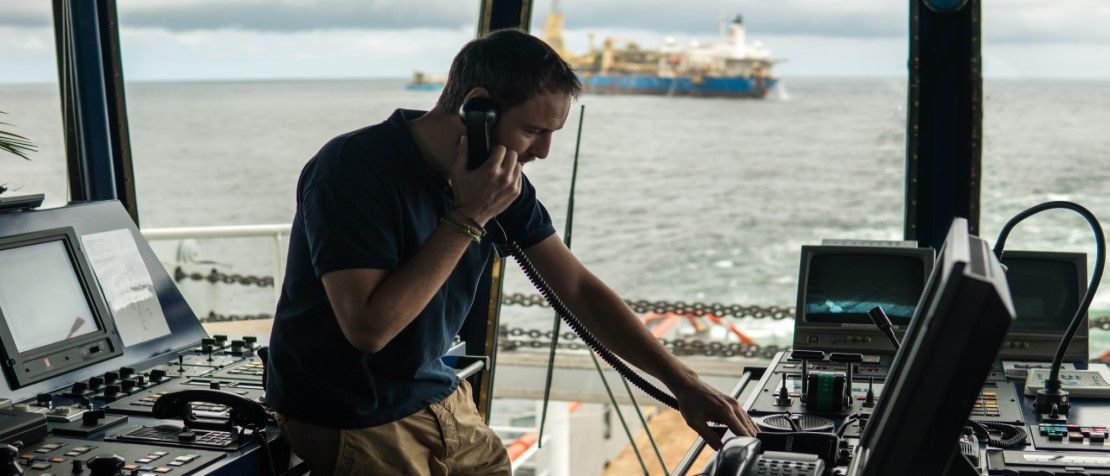
World Maritime Day: Keeping seafarers safe and connected
Throughout the COVID-19 pandemic, seafarers have served as frontline workers maintaining the flow of essential goods, such as food and medical supplies.
Given the entry restrictions imposed by many countries over the past year and a half, ships and crews have spent longer hours, days and months waiting offshore.
Onboard, modern maritime communication has helped keep seafarers safe and relatively comfortable, keeping them in touch with their families and updated on the evolution of the pandemic.
While radio and satellite phones remain vital tools, today’s seafarers also rely on digitally integrated systems and networks that would have been unimaginable just a decade or two ago.
Even as digital systems become commonplace, maritime communication needs are sure to keep evolving.
For seafarers, coastal communities, and the shipping industry worldwide, 30 September marks World Maritime Day. The International Telecommunication Union (ITU), for its part, reaffirms its commitment to assist its member states and stakeholders, including seafarers, in this vital area.
Shaping a safer future at sea
ITU aims to facilitate technology use to improve safety and security at sea, both through the allocation and protection of dedicated radio frequency spectrum and by developing global standards for maritime radio systems. As the United Nations specialized agency for digital technologies, it convenes high-level global meetings and facilitates international cooperation on key maritime communication issues.
In Sharm El-Sheikh, Egypt in 2019, at the last World Radiocommunication Conference (WRC-19), ITU Member States took important decisions to enhance safety at sea improving the efficiency of spectrum use for maritime communication.
The internationally recognized Global Maritime Distress and Safety System (GMDSS), developed jointly by the International Maritime Organization (IMO) and ITU, alerts shore-based search and rescue services when a ship needs help and notifies vessels in the vicinity to provide assistance.
WRC-19 allocated additional spectrum for the GMDSS, allowing expanded coverage and enhanced capabilities. These WRC-19 decisions include the addition of a non-geostationary satellite system which provides global services that will significantly improve satellite distress and safety communications in polar regions for seafarers.
Maritime publications and the online access and retrieval system (MARS)
ITU’s maritime publications provide key information when sailors or passengers need medical assistance, including the contact details of coastal radio stations that can provide medical advice worldwide.
ITU also manages the assignment and use of maritime identities.
Its maritime service publications consist of List IV (coast stations and special service stations), List V (ship stations and mobile service identity assignments), and the Maritime Manual (procedures for mobile and satellite communications at sea) for all GMDSS-equipped ships.
These service publications contain important information on radiocommunications for seafarers, including operational, GMDSS procedures and relevant regulations. List V includes ship stations information and List IV gives details of coast stations such as the operating frequencies, geographical coordinates and service provided – search and rescue, meteorological warnings, medical advice, and others –all over the world.
In addition, ITU maintains the Maritime Mobile Access and Retrieval System (MARS) which contains the latest registered information on ship and coastal stations. ITU’s MARS database is a free online resource available to all seafarers and the maritime industry. Search and rescue authorities worldwide rely on the ITU database as an essential information resource. MARS provides details of individual vessel communication facilities and emergency shore-based contact information which may be vital in resolving distress and safety scenarios.
Sector-specific standard setting
The safe operation of sea-going vessels everywhere depends on standardized and reliable maritime communication.
The communication systems that seafarers worldwide rely upon every day reflect extensive and ongoing international technical collaboration.
ITU’s Radiocommunication Sector (ITU-R) includes highly specialized Study Groups focused on the international framework for maritime communications. These ITU-R Study Groups aim to devise technical recommendations and promote progressively improved standards and procedures. Their ongoing work helps to shape the options considered by the World Radiocommunication Conference – or WRC – held every four years.
The decisions adopted at each WRC become part of the ITU Radio Regulations, the international treaty governing frequency allocation and usage. Freely available for download , the regulations include key provisions related to maritime distress, urgency, and safety communications, as well as professional knowledge, the qualifications for shipboard radio personnel, and documentation carriage requirements.
This harmonized approach promoted by ITU protects navigation and safety systems from harmful interference and misuse of frequencies.
E-navigation and GMDSS updates are on the agenda for the forthcoming WRC-23.
As we celebrate this year’s World Maritime Day, innovative technologies are at the forefront in enhancing safety, health, well-being and security at sea.
Image credit: Shutterstock
